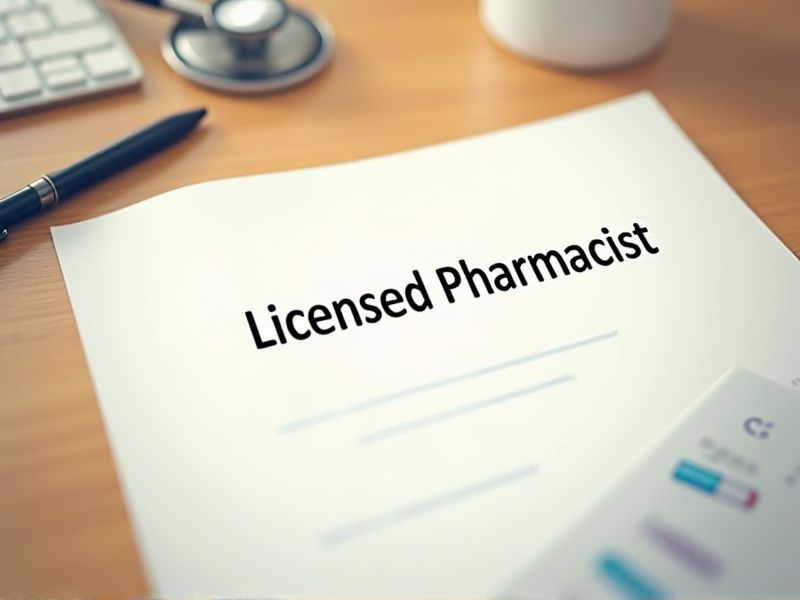
Licensed pharmacists require specific certifications to ensure they possess the necessary expertise to safely and effectively dispense medications. These certifications validate their ability to adhere to regulatory standards and provide essential healthcare advice to patients. As the pharmaceutical landscape evolves, pharmacists must stay updated on the latest practices and technologies through continual education. Here are some important certifications you may need as a licensed pharmacist.
State Pharmacist License
A state pharmacist license is required to ensure that a pharmacist meets the specific regulations and standards set by that state for safe and effective practice. This license verifies the pharmacist's qualifications and competency through exams that assess knowledge in pharmaceutical care and state-specific laws. Licensure helps maintain public trust by ensuring that pharmacists adhere to ethical practices and legal requirements. It also allows pharmacists to legally dispense medications and provide healthcare services within the state.
NAPLEX Certification
Earning NAPLEX certification ensures a pharmacist meets the standardized competency required for safe and effective practice. Passing the NAPLEX exam verifies a pharmacist's understanding of medication therapy and patient care. Regulatory boards require NAPLEX certification to maintain uniformity in pharmacy practice standards across different states. Obtaining NAPLEX certification serves as a critical step in a pharmacist's career, enabling them to legally dispense medications and counsel patients.
MPJE Certification
MPJE Certification is required for licensed pharmacists because it ensures knowledge of state-specific pharmacy laws and regulations. It helps to maintain consistent quality of care and legal compliance across states. Passing the MPJE confirms a pharmacist's ability to safely and legally perform professional duties. Most states mandate this certification as a crucial step for licensure and practice.
Board Certified Pharmacotherapy Specialist (BCPS)
A Board Certified Pharmacotherapy Specialist (BCPS) enhances a pharmacist's expertise, ensuring they provide optimized medication therapy management. This certification aligns pharmacists with the latest evidence-based practices, elevating patient care quality. As the healthcare landscape grows more complex, BCPS pharmacists serve as crucial resources in interdisciplinary teams. The growing demand for specialized medication regimens necessitates advanced competencies, underscoring the importance of BCPS for licensed pharmacists.
Board Certified Ambulatory Care Pharmacist (BCACP)
Board Certified Ambulatory Care Pharmacists (BCACP) enhance patient care by managing chronic conditions and medication therapies in outpatient settings. They improve medication adherence and minimize adverse drug events, crucial for optimizing therapeutic outcomes. Their specialized expertise supports healthcare teams in achieving better patient engagement and satisfaction. Certification distinguishes them as experts in ambulatory care, fostering trust and expanding professional opportunities.
Board Certified Critical Care Pharmacist (BCCCP)
Board Certified Critical Care Pharmacists enhance patient outcomes by applying advanced pharmacological knowledge in critical care settings. Their expertise proves essential for managing complex medication regimens and ensuring optimal therapeutic effects. Certification in critical care pharmacy validates a pharmacist's skills, thus increasing trust among healthcare professionals. BCCCP credentials provide a competitive edge, fostering career advancement and professional recognition in specialized healthcare environments.
Board Certified Oncology Pharmacist (BCOP)
Having a Board Certified Oncology Pharmacist (BCOP) ensures specialized expertise in complicated cancer treatment regimens, enhancing patient care. Licensed pharmacists without this certification might lack in-depth knowledge required for the latest oncology therapies and their side effects. BCOPs play a crucial role in interdisciplinary teams, collaborating closely with oncologists and nurses for optimal treatment planning. Pharmacists with oncology specialization aid in medication management, reducing error rates and improving therapeutic outcomes.
APhA Immunization Certification
The APhA Immunization Certification equips pharmacists with the necessary skills and knowledge to safely administer vaccines, meeting public health needs. This certification enhances a pharmacist's competence, ensuring compliance with legal and regulatory vaccination standards. It expands a pharmacist's role within healthcare teams, allowing them to contribute more significantly to disease prevention efforts. With the increasing demand for accessible immunization services, certified pharmacists can improve community health outcomes.
Certified Geriatric Pharmacist (CGP)
Licensed pharmacists often encounter complex medication regimens when working with elderly patients, necessitating specialized knowledge. The Certified Geriatric Pharmacist (CGP) designation equips pharmacists with expertise in pharmacotherapy for older adults, reducing medication-related issues. Older populations are often at higher risk for adverse drug reactions; CGPs enhance safety and efficacy in medication management. Geriatric certification also increases a pharmacist's ability to collaborate with healthcare teams in developing tailored therapeutic plans for aging patients.
Certified Diabetes Educator (CDE)
A Certified Diabetes Educator (CDE) provides specialized knowledge that enhances a licensed pharmacist's ability to manage patient diabetes care effectively. This expertise enables pharmacists to educate patients on medication management, lifestyle changes, and monitoring strategies crucial for controlling diabetes. The integration of a CDE's skills aids pharmacists in delivering personalized care plans, improving patient outcomes. Access to specialized diabetes education also supports pharmacists in collaborating with other healthcare professionals to streamline and optimize diabetes management protocols.
Summary
When you, as a licensed pharmacist, obtain additional certifications, your career prospects often expand significantly. Certifications can lead to specialized roles, increasing your potential for higher earnings. You may also gain recognition in your field, enhancing professional credibility among peers and employers. This can result in a greater capacity to impact patient care through advanced expertise and services.
